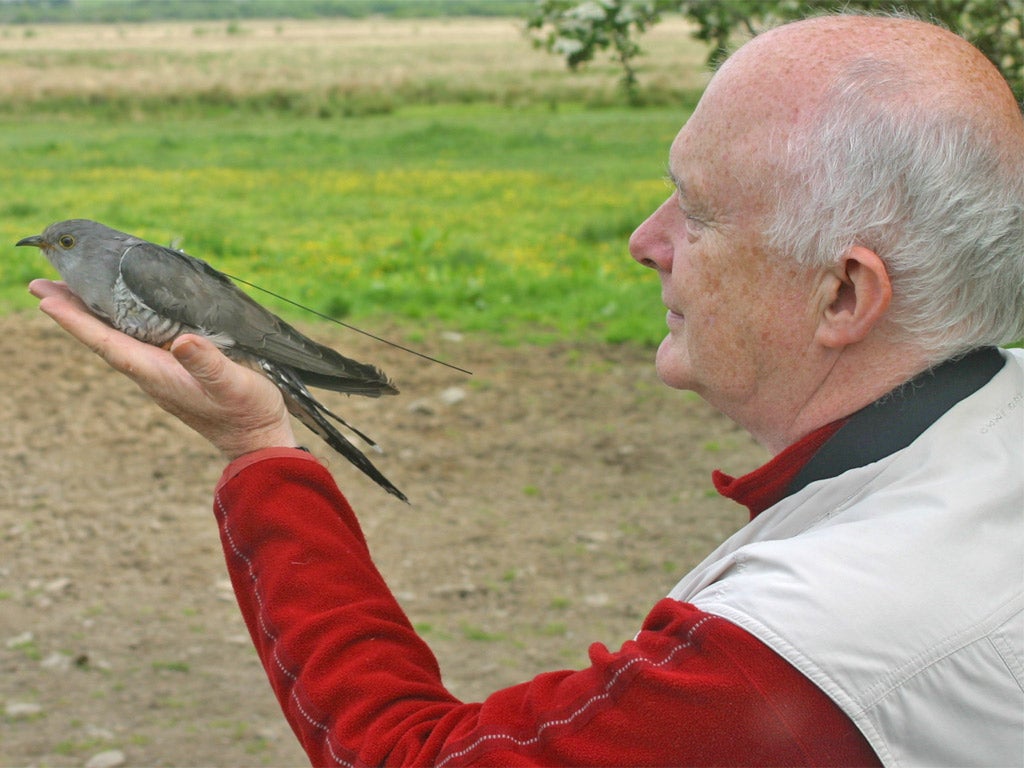Nature Studies by Michael McCarthy: Good luck, Indy – the cuckoo that's carrying our name to Africa
I thought he was beautiful beyond description. And then I let him fly

The Independent has a new bird. We've always had an eagle – look at our masthead – but now we've got a cuckoo. His name is Indy, and, if fate preserves him, we will be closely following his migratory journey back to his winter quarters in Central Africa, and then his return to Britain next summer, an odyssey of 10,000 miles or so.
He's one of 13 British cuckoos, including five from Scotland and four from Wales, which have been tagged with mini satellite transmitters this summer by the British Trust for Ornithology in its quest to find out why the birds, whose two-note call is the most distinctive sign of spring, are declining so precipitately – their numbers dropped in England by 65 per cent between 1984 and 2009.
It may be a problem here on their breeding grounds, such as the disappearance of the hairy caterpillars on which they feed. But it may also be something happening to them on their vast migratory voyages, about which virtually nothing was known until last year when the BTO fitted satellite tags to five cuckoos from Norfolk and successfully monitored their travels to Africa and back.
The journeys of Chris, Clement, Kasper, Lyster and Martin, which we reported in The Independent, provided a wealth of knowledge new to science, such as when the birds leave Britain (much earlier than was thought, even in early June), which way they travel to Africa (some via Italy, some via Spain) and where they end up for the winter after their epic crossing of the Sahara (the Congo – that is, Congo-Brazzaville, the old French Congo).
Although all the birds made it to their wintering grounds, two of them died on the return journey – Clement in Cameroon in February, and Martin in Spain in April – while a third bird, Kasper, last heard of in Algeria in April, is now also presumed lost. But the remaining two, Lyster and Chris, triumphantly made it back to Norfolk and began cuckooing over the countryside in May, in search of females.
Now we hope to follow the similar journey of Indy, with the added interest that we have adopted him on behalf of the newspaper and Independent readers. He's not a Norfolk bird – he comes from Central Wales, and we made his acquaintance at dawn on 30 May, in one of the remotest Welsh landscapes, the great blanket bog north of Tregaron known as Cors Caron, where he came swooping out of the mist on his long grey wings, and cuckooing, at about 4.40am.
He was seduced by the tape-recording of a female cuckoo's weird, loud bubbling call, which had been set up by BTO researchers Dr Chris Hewson and Dr Phil Atkinson, helped by the BTO's man in Wales Kelvin Jones and local ornithologist Tony Cross. He spent more than two hours flying around the area, which is a Countryside Council for Wales nature reserve, until eventually he was caught in a mist net (entirely unharmed).
Chris and Phil then fitted him with his ultra-lightweight transmitter, and recorded his details – he's one or two years old, has already been to Africa, and weighs 119 grams – before allowing me to release him, which felt like the most enormous privilege. With his soft, grey head, his slate-grey wings and his barred breast, I thought he was beautiful beyond description, before I let him go to fly back out over Cors Caron.
He spent the next fortnight cruising around the area, until about 15 June when he began his migration, and on Monday was near Pirbright in Surrey, 153 miles to the east-south-east. Then, at 11am yesterday, a signal came through showing that he had crossed the Channel and was now in Picardie in Northern France, near the little town of Moreuil, just south of Amiens.
The Congo, here we come. Bon voyage, Indy. We'll be watching.
You too can join the adventure
Want to name a cuckoo yourself? Of the 13 birds being followed to Africa by the BTO over the next year, five are still unnamed: three from Scotland, one from England and one from Wales. The named Scottish birds are Wallace and BB; the named English birds are Lyster, Chris and Reacher; and the named Welsh birds Indy, Iolo and David.
You can have a bird given the name of your choice if you will donate the £3,000 cost of the satellite transmitter tag to the BTO; otherwise, you can be a £10 sponsor of a cuckoo, as many hundreds of people were last year, and send in your choice of name, and the winner will be pulled out of a hat. Details on the BTO website at www.bto.org/cuckoos
Just a quick visit
Most surprising fact from the cuckoo-tracking programme: how short the birds' stay in Britain can be. Cuckoo Chris arrived back in the UK on 1 May 2012, and left again between 10 and 13 June. We think of the cuckoo as a British bird, but Chris was here for less than six weeks.
Subscribe to Independent Premium to bookmark this article
Want to bookmark your favourite articles and stories to read or reference later? Start your Independent Premium subscription today.

Join our commenting forum
Join thought-provoking conversations, follow other Independent readers and see their replies